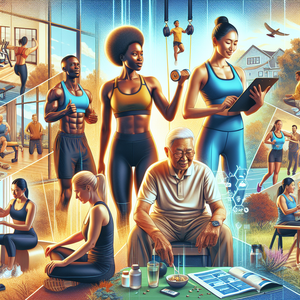
Exploring Career Paths in the UFC: 10 Key Roles in the MMA Industry
The world of mixed martial arts (MMA), particularly within the Ultimate Fighting Championship (UFC), is not just about the exhilarating fights and skilled athletes—it’s a complex ecosystem powered by a diverse array of professionals. As the UFC continues to gain traction globally, the need for dedicated individuals across various sectors is on the rise. This article delves into ten essential career opportunities in the UFC and MMA landscape, highlighting the critical roles that support fighters and enrich the sport. From coaching and event planning to marketing and athlete management, each position plays a vital role in ensuring the success and sustainability of the UFC. We will also touch on current industry trends, average salaries, and personal stories from those in the field, encouraging readers to consider how they can become part of this dynamic industry.
Job Summaries:
MMA Coach:
- An MMA coach is integral to a fighter's development.
- Imparts knowledge in disciplines like Brazilian Jiu-Jitsu, wrestling, and striking.
- Crafts tailored training regimens.
- Provides constructive feedback.
- Mentally prepares athletes for competition.
- A strong background in martial arts and coaching experience is essential for aspiring coaches.
- Refines techniques and nurtures mental resilience, which is crucial for success in the octagon.
Event Coordinator:
- The role of an event coordinator is pivotal in executing fight nights.
- Managing everything from venue selection to logistics and regulatory compliance.
- This position requires exceptional organizational skills.
- The ability to multitask effectively is essential.
- A degree in event management or a related field is often preferred.
- Experience in sports is often preferred.
- Coordinators create unforgettable experiences for fans.
- Ensuring seamless event operations is a key responsibility.
Sports Nutritionist:
- Sports nutritionists work closely with fighters to develop personalized nutrition strategies that optimize performance and recovery.
- They assess dietary needs, educate athletes on healthy eating, and monitor progress.
- Typically, a degree in nutrition or dietetics, along with certifications in sports nutrition, is necessary.
- The impact of a nutritionist on a fighter's physical condition is profound, directly affecting their performance during bouts.
Athlete Manager:
- Athlete managers handle the business side of a fighter's career.
- Negotiating contracts, securing sponsorships, and managing public relations are key responsibilities.
- Strong negotiation skills and a solid understanding of the sports landscape are critical.
- Backgrounds in business or sports management can be beneficial.
- Managers play a significant role in shaping a fighter's career path.
- They ensure fighters receive fair compensation and opportunities for growth.
Strength and Conditioning Coach:
- Strength and conditioning coaches develop training programs aimed at enhancing fighters' physical capabilities through strength training and injury prevention strategies.
- A background in exercise science and relevant certifications is typically required.
- These coaches are essential for preparing athletes for the rigors of competition, helping them achieve optimal performance levels.
UFC Matchmaker:
- Matchmakers are crucial in pairing fighters for bouts, considering their records, fighting styles, and marketability.
- This role demands in-depth knowledge of MMA and the ability to evaluate fighters' skills accurately.
- Effective communication and networking abilities are vital, as matchmakers regularly engage with fighters, managers, and promoters.
- Their decisions influence fight cards and can significantly impact the UFC's success.
Marketing Specialist:
- Marketing specialists design and implement strategies to promote UFC events and fighters.
- This involves developing marketing campaigns, managing social media, and analyzing market trends.
- A degree in marketing or communications, along with experience in the sports industry, is generally required.
- Marketing efforts are essential for building brand awareness and fan engagement, driving the UFC's continued expansion.
Sports Psychologist:
- Sports psychologists help fighters enhance their mental resilience and focus, particularly under pressure.
- A degree in psychology, with additional certification in sports psychology, is often preferred.
- These professionals assist athletes in managing competition-related stress, making them an integral part of a fighter's support system and influencing their performance in the octagon.
Athletic Trainer:
- Athletic trainers are responsible for injury prevention, evaluation, and rehabilitation.
- They work closely with medical professionals to ensure fighters are fit to compete.
- A degree in athletic training and relevant certifications are necessary for this role.
- Trainers are vital in maintaining fighters' health and extending their careers.
- They help fighters recover from injuries and stay in peak condition.
Broadcasting Analyst:
- Broadcasting analysts provide commentary and insights during UFC events, enhancing the viewing experience for fans.
- This role requires a deep understanding of MMA, excellent communication skills, and often prior experience in sports journalism.
- Analysts enrich the audience's appreciation of the sport by explaining the nuances of the fights.
Each of these ten career paths illustrates the diverse opportunities available in the UFC and MMA industry, highlighting how essential these roles are to the overall success of the sport. As the industry continues to evolve, aspiring professionals can find numerous job openings that match their skills and passions, whether in coaching, management, marketing, or support services. By understanding the significance of each role and their contributions to the UFC, readers can better navigate their career aspirations in this exciting and rapidly growing field. Embracing the journey within this vibrant ecosystem offers not just a career, but a chance to be part of a sport that captivates millions around the world.
Explore More Jobs

